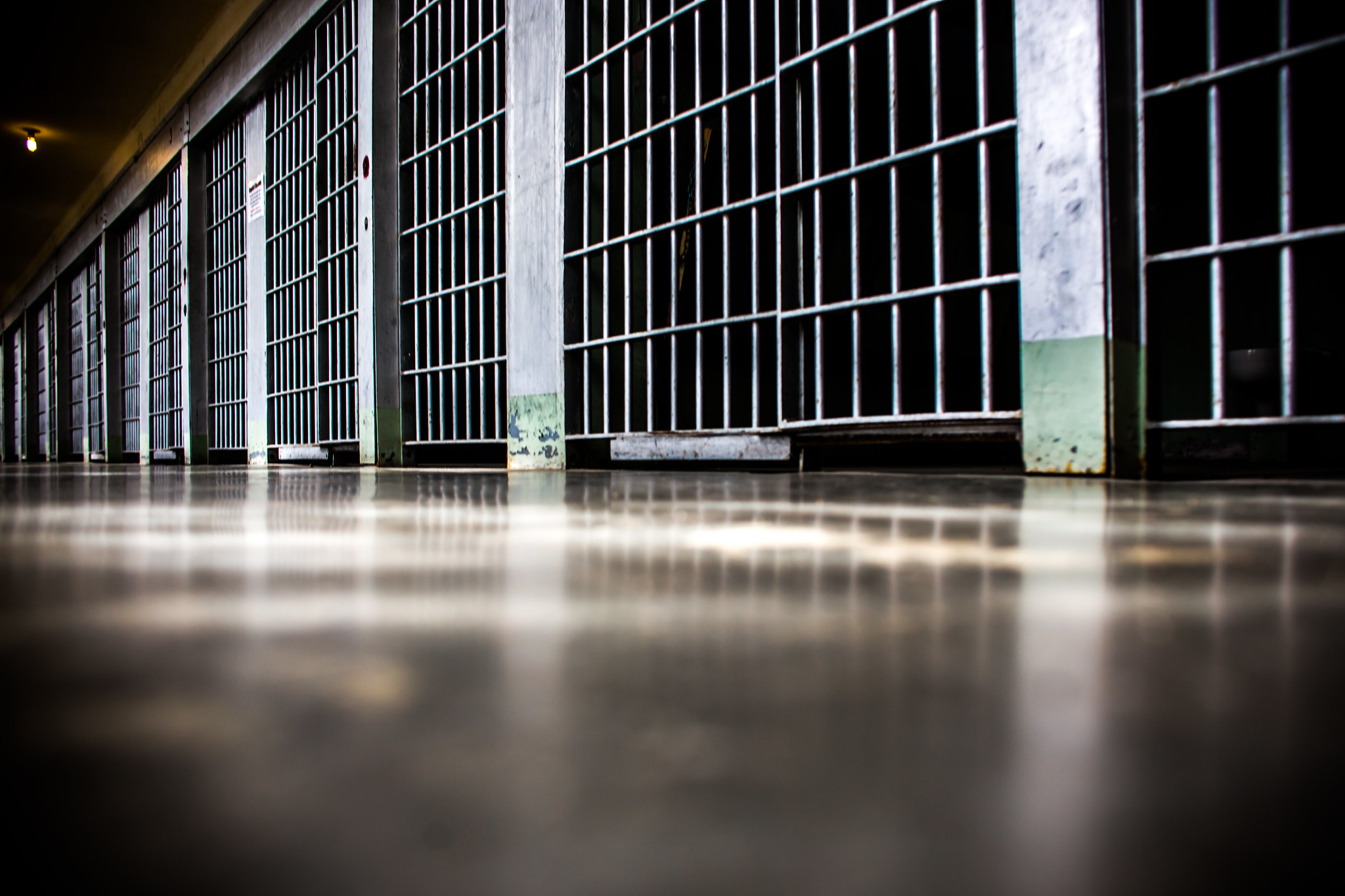Here’s a look at the blighted prison system that Donald Trump took over from Biden, along with some new scandals that have already occurred since Trump’s inauguration.

Prison Bound. (Thomas Hawk, Flickr, CC BY-NC 2.0)
 I wrote just before the 2024 presidential election that the state of prisons in the U.S. was disastrous. Joe Biden had done literally nothing to improve on one of the worst run prison systems in the industrialized world. At federal, state and local levels, inmates in America’s prisons are subjected daily to violence, maltreatment, poor healthcare and animal-grade food. Tuberculosis, hepatitis and HIV are rampant.
I wrote just before the 2024 presidential election that the state of prisons in the U.S. was disastrous. Joe Biden had done literally nothing to improve on one of the worst run prison systems in the industrialized world. At federal, state and local levels, inmates in America’s prisons are subjected daily to violence, maltreatment, poor healthcare and animal-grade food. Tuberculosis, hepatitis and HIV are rampant.
Courts rule routinely that prisons violate prisoners’ human rights and that if not corrected, they should be closed. But that almost never happens. Now Donald Trump has a chance to make things right. He likely won’t — or can’t — but at least he has a record of trying to reform sentencing. Here’s what he’s looking at to begin his second term:
The federal Bureau of Prisons (BOP) Metropolitan Detention Center (MDC) in Brooklyn, currently home to rap mogul Sean “P. Diddy” Combs, accused assassin Luigi Mangione and crypto scammer Sam Bankman-Freed is in the news again.
Fully 25 percent of staff positions have been vacant there and are unlikely to be filled soon because pay is bad, hours are long and violence is endemic. Just a week before the presidential election, a Justice Department (DOJ) Inspector General (IG) team conducted an unannounced sweep of the prison and uncovered a treasure trove of contraband cell phones, drugs, electronics and weapons. A prison guard was charged with smuggling.

Metropolitan Detention Center, Brooklyn, 2008. (Jim.henderson/Wikimedia Commons/Public Domain)
In addition, the MDC has been cited for maintenance problems, power outages, raw sewage, and “conditions so inhumane that some federal judges have refused requests from prosecutors to detain defendants there.” In March, another 25 prisoners were charged with crimes related to the contraband and to violence.
For at least the past five years, the Justice Department and federal and state judges have demanded that the state and city of New York close the notorious and violent Rikers Island prison. The facility remains open, however, and there are no plans to close it, reform it, or move prisoners to other facilities in the foreseeable future. In the meantime, it is as violent as ever inside the lockup.
On Feb. 18, charges were filed against nine New York Department of Corrections and Community Services guards after they allegedly beat prisoner Robert L. Brooks to death. The beating was captured on all the guards’ body cameras. And what was the reaction to the charges? Guards at three New York prisons went on strike. That led to complete lockdowns at all three prisons, resulting in yet more violence and turmoil.
Near Death by Spider Bite
Meanwhile, the federal Eighth Circuit Court of Appeals affirmed the denial of qualified immunity to Arkansas prison guards after prisoner Eddie Humes, Sr. nearly died following a spider bite.
Humes reported to guards at the White County Detention Center that a spider had bitten him on the hand and that he was in pain. Guards ignored him. After three days, according to Humes’ attorneys, his hand and arm “had swollen to the size of a watermelon.” Still he was ignored.
Six days after the bite, Humes filed a grievance against the guards for ignoring his medical emergency. He was finally taken to a hospital, which diagnosed a staph infection, gave him intravenous antibiotics and sent him back to prison. A day later, however, he developed a high fever and was again taken to the hospital, where he underwent emergency surgery. The prison’s response was to simply release him. After all, if he’s not a prisoner, the prison doesn’t have to pay his medical bills, and if he dies, it’s not their problem. The court ruled that the entire response to the bite was illegal, and Humes’ case can continue to move forward.
‘Place of Unfettered Violence’

Aerial view of the Trousdale Turner Correctional Center in Tennessee. (Prison Insight/Flickr, CC BY 2.0)
In another development, the Justice Department announced that it was investigating private prison company CoreCivic after the mother of a prisoner murdered in Tennessee’s Trousdale Turner Correctional Center reached a settlement with the company. The U.S. attorney for Tennessee said that Trousdale Turner had been a place of unfettered violence since it opened in 2016 and that prisoners’ civil rights were routinely violated there. The most recent example related to prisoner Marktavious Twilley, who was murdered during a fight while guards “allowed it to continue because of severe understaffing.” The investigation is ongoing.
Don’t expect any quick turnarounds in the federal prison system or in federal oversight of state and local prison and jail systems. BOP Director Collette Peters, whom Donald Trump appointed in 2022 as a “reformer” after some success running the Oregon Department of Corrections, abruptly and without any announcement resigned on Trump’s first day in office this year.
She had been criticized by both Republicans and Democrats on Capitol Hill for her lack of transparency, absence of vision, and failure to turn the BOP around.
The only thing of note that Peters accomplished in her two-and-a-half years as BOP director was the closure of the Federal Correctional Institution at Dublin, California, a women’s prison known as “the Rape Club,” after eight prison officials, including the warden, the deputy warden and the chaplain were successfully prosecuted for sexually assaulting prisoners there. DOJ paid the victims a $116 million settlement.
I’m a realist. I don’t expect any improvements in the U.S. prison system. We’ve had generations of poor leadership at every level of government and in federal and state legislatures. The only hope for reform lies in the courts. But what good is even that, if court orders aren’t implemented? American prisoners, in the meantime, will have to realize that even the shortest sentence on a minor crime could mean death, whether from violence, neglect, or an untreated medical condition. I wish them luck.
John Kiriakou is a former C.I.A. counterterrorism officer and a former senior investigator with the Senate Foreign Relations Committee. John became the sixth whistleblower indicted by the Obama administration under the Espionage Act—a law designed to punish spies. He served 23 months in prison as a result of his attempts to oppose the Bush administration’s torture program.
This article is from the author’s Substack.
The views expressed are solely those of the author and may or may not reflect those of Consortium News.

Yes Lois, an ‘organized racket’ is what general Smedley Butler
said in the 1930’s of the US after his military experience of killing people,
so he said: “The flag follows the dollar and the soldier follows the flag.”
Yes Lois, a “criminal racket” is what General Smedley Butler said of
the United States in the 1930’s, after his military experience of
killing people, so he said: “The flag follows the dollar and the
soldier follows the flag.”
John, your prison experience is still reaping truthful fruit,
but the realism is depressing: “If any one is to be taken
captive, to captivity he goes . . .” (Revelations:13.10).
Over and over, this guy writes articles describing inhumane prison conditions and says there is nothing that can be done, there is no hope. In doing so, he ignores and dismisses the efforts of the very large number of organizations across the country that try to address this issue. These organizations are staffed by everyday, working class people who dedicate their lives to doing precisely the kind of work that the author refuses to do.
The US is not a country. Maybe it never really was. It’s an organized criminal racket. The only way things will change is if the majority of people subjected to an ever deepening humanitarian nightmare, rise up and force the whole operation to shut down.